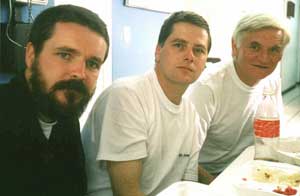5 February 2004 Edition
Concern at delay in Colombia verdict

Niall Connolly, Martin McCauley and Jim Monaghan
The EU and the Dublin Government need to make strong representations on behalf of the Colombia Three. This was the message of a delegation of Irish parliamentarians who have returned from a visit to Bogota last week. There, they visited with the three Irishmen who are awaiting a verdict on charges of training FARC guerrillas, and held meetings with Colombian officials, international diplomats and human rights groups. Niall Connolly, Martin McCauley and Jim Monaghan have now been held in jail for 987 days.
The delegation included Fianna Fáil MEP Niall Andrews, Fianna Fáil Senator Mary White, Sinn Féin TD Seán Crowe, Bring Them Home campaign organiser Caitríona Ruane and US lawyer Steve McCabe.
Before travelling, the Irish elected representatives held a news conference in the EU Parliament offices in Dublin, where they urged the Dublin Government to use its stated aim of promoting human rights during its EU Presidency by calling for justice for the Colombia Three.
Whilst in Colombia, the delegation held high level meetings with senior members of the Colombian Government. They discussed the case with Vice President Francisco Santosand with the Vice Ministers for Justice Foreign Affairs.
They also met with the EU delegate to Colombia, the Dutch ambassador to Colombia, the Catholic Church, the United Nations and the Vice President of Colombia's Council of Judges. They had two visits with the three men in the notorious La Modelo Jail.
During the meetings with the Colombian Ministers, the delegation presented the report compiled by 16 observers, politicians and lawyers from three continents, who after witnessing the trial said they had seen and heard no evidence to substantiate the charge that the men were training the FARC. All the government Ministers were quick to assure the delegation that the judge would be free from political interference in making his decision.
Before and during the trial, prejudicial comments were made by senior members of the Colombian Government (including former president Andres Pastrana and current president, Alvaro Uribe) and the former head of the Armed Forces, General Mora.
The delegation repeated the concerns of the international observers over the long delay between the end of the trial and the still awaited verdict, nearly six months later. The juryless trial, before a single Colombian judge, began on 4 October 2002 and concluded on 1 August 2003, after seven adjournments.
The Colombian politicians acknowledged the length of the delay and explained that this was due to structural problems with Colombia's justice system. Nevertheless, Niall Andrews said on his return last week that he remains concerned about the length of time the three Irishmen have been left in virtual limbo. "Justice delayed is justice denied," he said.
Seán Crowe said that, as Bertie Ahern had put human rights at the heart of the Irish EU presidency, the Taoiseach needs now to stand up publicly and call for the men to be sent home. "He needs to make representations to the Colombian Government," said the Sinn Féin TD.
"The judge must be able to make his decision free from political interference," said Bring Them Home campaign organiser Caitríona Ruane. "It is vital at this time that the Irish Government and the EU act to protect the human rights of these three Irish and EU citizens. Given the lack of evidence in the prosecution case, these three men should have been home with their families many months ago."
Steve McCabe reported that five Irish-American organisations last week made representations to the Colombian Ambassador to the United States in New York raising their concerns about the case.
During their meeting with the United Nations lawyer in Bogota, the delegation was told that the international organisation is extremely concerned at the deteriorating human rights situation in Colombia. EU External Relations Commissioner Chris Patten recently visited Bogota, where he listed 24 conditions, mainly related to human rights, which would be necessary before the EU could consider giving the country economic aid. Colombian President Uribe is due to visit the European Parliament next week.
The Bring Them Home campaign is again calling on people around the world who are concerned for the fate of the three Irishmen to send letters outlining their concerns to Colombian embassies and consulates.
The aim is to bombard the Colombian establishment with protests.
Contact Colombian embassies and consulates throughout the world.
Write a personalised letter directly to the Colombian President Alvaro Uribe at [email protected]
The President can also be contacted by E-mail through the Colombian web site:
http://www.colombiaemb.org
In Ireland contact:
Colombian Honorary Consul
Mr Ines Elvira de Tynan
Calima
Brighton Road
Foxrock
Dublin 18
e-mail : [email protected]
In the US, contact:
Ambassador Luis Alberto Moreno,
The Embassy of Colombia,
2118 Lero Place NW,
Washington, D.C. 20008;
Phone: 202 387-8338; Fax: 202-232-8643;
E-mail: [email protected]
In Australia contact:
Mr J Alzamora
Colombian Consul General
Level 12, 100 Walker Street
North Sydney, 2000
Australia
In England, Scotland & Wales contact:
Colombian Embassy
3 Hans Crescent
London SWIX OLN
Tel. 0207 589 9177 / 589 5037 (Human Rights Officer's extension is 112)
Fax 0207 581 1829 / 589 4718
website www.colombianembassy.co.uk
email [email protected]
